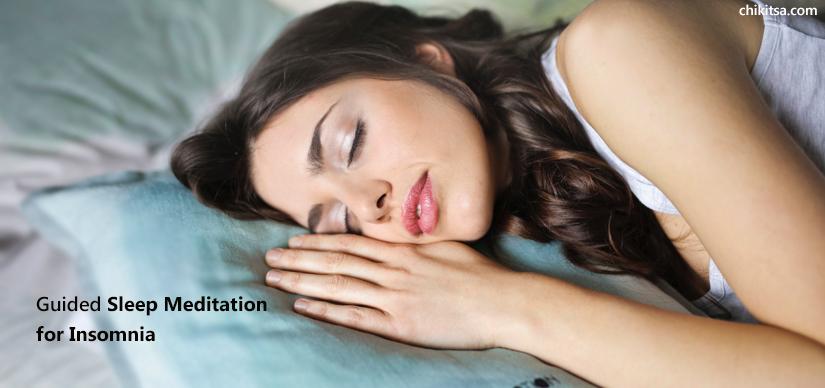Guided Sleep Meditation For Insomnia

Improper sleep is the root cause of several physical and emotional health problems. A drastic rise in competition, ever-increasing stress at work or family and also a rise in the number of hours spent on the use of mobile phones especially at bedtime, has directly led to an increase in the average number of cases of insomnia or other sleep disorders.
Normal adults function best when they are able to get about 7-9 hours of sleep per day. According to studies, nearly 15% of the population belonging to developed countries suffers from severe or chronic sleep disorders. The commonest problems with sleep are;
- Hypersomnia – Trouble staying awake or excessive daytime sleepiness
- Insomnia – Trouble sleeping due to sleep onset delay and restless leg syndrome
- Parasomnia – Abnormal behavior or sensations while sleeping such as sleepwalking (somnambulism) and night terrors
This article will help you understand the possible causes behind insomnia or disturbed sleep and how to use guided sleep meditation for insomnia.
Causes Of Sleep Disorders
Sleep disorders may be acute, that is, of short duration or chronic or of long term. Sleep disorders or insomnia can be termed chronic if they occur at least three nights a week for three months.
Acute insomnia which lasts for a short duration may occur due to causes such as;
- Change of job or loss of job
- Fear or fright due to traumatic accidents or incidents
- Death of a loved one
- Moving to a new place
- Environmental factors such as too much light, noise extremes of temperature
Causes of sleep disorders or insomnia for prolonged duration can be the following;
- Physical factors such as headache, migraine, rheumatic joint pain, fibromyalgia
- Medical conditions like bronchial asthma
- Psychiatric conditions like depression or anxiety disorders
- Environmental conditions like excessive light, noise or snoring partner
- Genetics plays an important role in sleep regulation and wakefulness
- Night Shifts – Persons who are used to working at night shifts observe a major change in their biological clock. These people often find it difficult to sleep at night and are sleepier during the day.
- Certain medications can interfere with the normal sleep cycle such as over the counter medicines for cold, anti-hypertensive medicines and anti-depressants.
- Alcohol and other substance abuse, dependence or withdrawal.
Guided Sleep Meditation For Insomnia
Meditation has been a part of the Indian lifestyle and practices for almost thousands of years. It has been practiced and preached by yogic gurus and saints and is known to invoke a sense of mindfulness in us.
What exactly is mindfulness? Mindfulness means that the mind is attentive towards what is happening in the present state and situation; attentive towards the surroundings and to what you are doing. This can often be cultivated by means of meditation. However, when practiced while lying down, it can lead to sleep.
Guided meditation is beneficial for the integration of brain functions and regulation of various physiological activities resulting in physical, mental and emotional well being. Practicing meditation regularly continuously resets the metabolic functioning irrespective of the varying levels of stress.
Guided sleep meditation plays a very important role in the regulation of hypothalamopituitary adrenal axis (controls sleep) and also the regulation of the hormones linked to sleep such as cortisol, catecholamines, melatonin and pituitary hormones like growth hormone, prolactin, and thyroid-stimulating hormone.
Specifically, melatonin is an essential sleep hormone because;
- It is vital for the regulation of sleep.
- In conventional medicine, melatonin is widely used for the management of sleep regulation disorders in people who work at night shifts, persons having jet lag and/or insomnia.
- Melatonin also has other effects such as antioxidant, immune-modulator effect and also anti-aging.
- Melatonin gradually declines in people as they age and therefore poor sleep quality is often seen in the aged population.
Guided Sleep Meditation Helps To;
- Enhance the levels of melatonin
- Enhance levels of serotonin (precursor of melatonin)
- Enhances levels of nor-adrenalin
A recent study found out that guided sleep meditation for insomnia helps in increasing levels of melatonin by slowing down its metabolism by the liver or by stimulating the pineal gland to release more melatonin.
A study concluded that the diurnal levels of melatonin were higher among Vipassana meditators in contrast to non-meditating individuals. Considering the role of melatonin in sleep regulation and sleep maintenance, it can be concluded that guided sleep meditation for insomnia helps to increase melatonin levels and hence improves the quality of sleep.
Sleep is linked to reduced blood pressure, heart rate, respiratory rate and rhythm, and a decrease in anxiety and an overall reduction in basal metabolic rate resulting in a hypo-metabolic state. This hypo-metabolic state is normal and is necessary for survival.
Guided sleep meditation brings on a hypo-metabolic state or a state of relaxation response which directly helps in sleep initiation. Also, guided sleep meditation techniques help in the regulation of blood flow to sleep centers of the brain during sleep. Meditative practices may greatly influence physiological and behavioral states during sleep.
Sleeping for less than seven hours per night increases the risk of developing diabetes mellitus, cardiovascular illnesses, and unhealthy eating habits which become a causative factor for other chronic diseases. Also, people who are sleep deprived tend to have poor productivity at work, are prone to making more errors at work and drive more dangerously.
Increased and better sleep, on the contrary, can significantly reduce the levels of stress, improves memory and mental clarity, reduces the risk of Alzheimer’s disease and also provides a better general sense of well being.
Achieving a proper and uninterrupted sleep has emerged as an essential component towards leading a healthy lifestyle. Guided sleep meditation must be tried out by people suffering from sleep disorders or insomnia as this therapy offers techniques to relax the mind and body and promote rest along with an improved quality of sleep.









